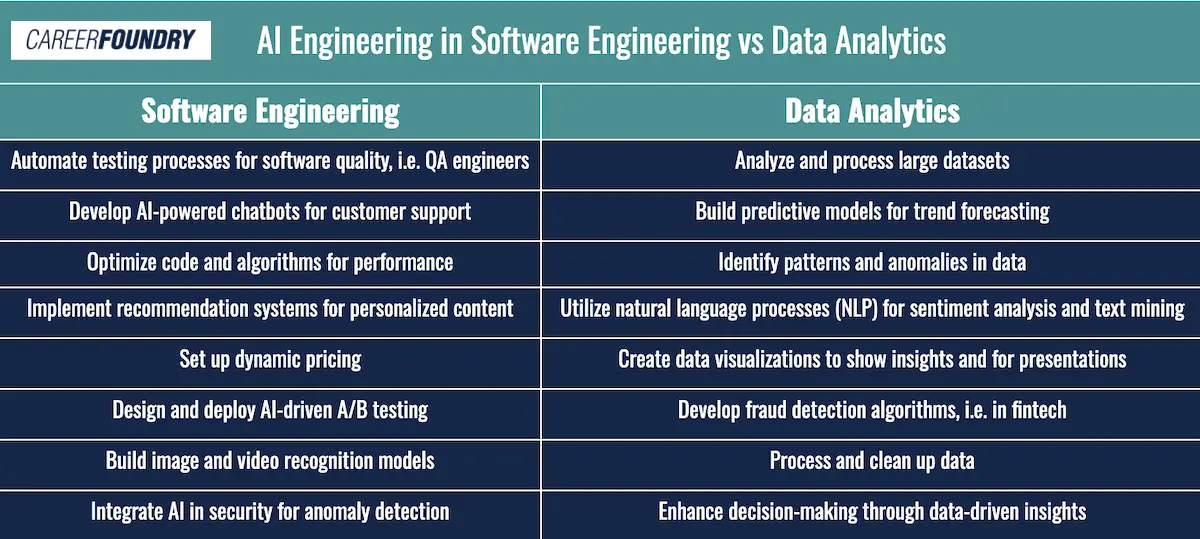Ever wondered about the people behind AI technology? Maybe you heard about all the funding going towards AI and want to get involved in that action?
In this article we’ll go over how to become an AI engineer, and what this field involves. Given it’s been the big story of the past year, does it make sense to transition from web development to AI engineering?
AI engineering is a massive sector that spans across both the fields of software engineering and data. While you might have heard about the tools shaping self-driving cars and recommending binge-worthy shows, there are so many other ways AI is incorporated in these fields (and growing all the time).
In this article, we’ll demystify this exciting area and spotlight the skills needed to start working in it. Whether you’re a Python pro, a coding newbie, or just spend a bit too much time with ChatGPT, lets learn what it takes to transition to an AI engineer.
To jump to a specific section, you can click right on the heading below.
- What is an AI engineer?
- What does an AI engineer do?
- How to get into AI engineering from scratch
- AI engineer FAQs
1. What is an AI engineer?
AI engineers are the coders working behind the scenes, conjuring up tech magic that makes machines think like humans. They’re the the architects of your phone’s eerie ability to anticipate your preferences, and to tell you the cheapest day to buy your flight.
From making shopping a personalized adventure to spotting shady stuff online, the work artificial intelligence engineers (and their machine learning engineer peers) is seen everywhere. They’re fluent in AI programming languages such as Python and R.
You can imagine AI engineers as the interpreters bridging the gap between intricate code and the innovative technology that shapes our lives. They craft AI systems that diagnose illnesses, predict market trends, and engage us in seamless conversations.
2. What does an AI engineer do?
Okay, but what do AI engineers actually do? The short answer is…it depends.
As we mentioned earlier, AI engineering bridges fields, so how it’s used depends on the company and product. Let’s go over a few examples of how AI is used in software engineering vs. in data analytics.
AI engineer tasks and responsibilities
Let’s break down some examples of different ways these engineers might use the technology in their fields.

AI engineer skills
We’ve covered what AI engineers do, but what skills do you need to work in the sector? Let’s cover the top three:
1. Programming proficiency
Unsurprisingly, programming is an important skill for AI engineering. Specifically Python, with its wealth of libraries like TensorFlow, PyTorch, and scikit-learn, is the go-to language for building and training AI models.
Mastering Python lets you harness the power of AI libraries, translate algorithms into code, and breathe life into your AI creations.
Python is the most commonly used programming language in the field of artificial intelligence and machine learning, and it’s extensively used for various AI engineering roles and tasks.
R, on the other hand, is still used in some specialized areas, particularly in certain statistical analysis and data science applications. However, its usage in AI has become less prevalent compared to Python.
2. Machine learning understanding
As you’ll likely be conjuring up models that can learn from data, understanding machine learning concepts is important.
From regression to deep learning, and becoming familiar with frameworks like TensorFlow and PyTorch is crucial. With this skill, you’ll transform raw data into predictive insights.
3. Mathematics and statistics
AI engineers need to have a solid understanding of mathematics, because it forms the foundation upon which artificial intelligence and machine learning algorithms are built.
Many AI algorithms, like those used in machine learning and deep learning, are rooted in mathematical concepts. Understanding the math allows engineers to comprehend how these algorithms work, enabling them to make informed decisions during model development and optimization.
Brushing up on linear algebra, probability, calculus, and statistics is one skill that won’t go amiss.
3. How to get into AI engineering from scratch
So being an AI engineer sounds like it might be for you? You might be wondering how to break into this field. Let’s go through so broad steps:
Build your foundation with Python
First, you want to build a strong foundation. You’ll need a solid understanding of programming fundamentals and a programming language like Python.
The CareerFoundry Python for Web Developers Course is particularly designed to give coders that understanding—with the projects to match. Studying flexibly at 15 hours per week for two months, you’ll learn to master Python, in particular the Django framework, with the help of an experienced mentor.
For those with more data analytics knowledge under their belt, our Machine Learning with Python Course will provide even more skills for working with generative AI. In it, you’ll learn and apply the ML skills and develop the experience needed to stand out from the crowd.
Away from CareerFoundry, online platforms like Codecademy, Coursera, and edX offer unmentored introductory courses that can help with this as well. If you’d prefer to learn data from scratch, there are also data bootcamps, both online and in person.
Grow your math skills
Next, learn the relevant mathematics and statistics concepts.
Key mathematical concepts include:
- linear algebra
- calculus
- probability
- statistics
These form the bedrock of AI algorithms. Platforms like Khan Academy and MIT OpenCourseWare provide free resources.
Engage with AI concepts
Next, get familiar with AI concepts. Study the basics of artificial intelligence, machine learning, and deep learning. Online courses such as Andrew Ng’s Deep Learning course on Coursera are one place to start here.
Kick off projects
To demonstrate your knowledge and apply to jobs you’ll then need to start working on projects. Start with small AI projects and simple tasks like image classification and gradually move on to more complex projects. Use popular AI libraries and frameworks like TensorFlow and PyTorch.
One way to get more experience is to participate in Kaggle competitions to solve real-world AI challenges. This hands-on experience helps you refine your skills and learn from the AI community.
Alternatively, if you want to go the more traditional route and have years to dedicate to building the skills, you can consider pursuing a bachelor’s or master’s degree in computer science, data science, or a related field.
Transitioning from web development to AI engineering
If you’re already a web developer, do you have transferable skills in the field of AI engineering?
Transitioning from web development to AI engineering can be a rewarding choice for those seeking new challenges and opportunities. Many skills, such as programming fundamentals (especially Python), problem-solving abilities, and familiarity with software development processes, are transferable from web development to AI engineering.
However, you’ll need to acquire new expertise in areas like machine learning algorithms, deep learning frameworks (such as TensorFlow or PyTorch), data preprocessing, and model evaluation.
As AI engineering involves complex data analysis, algorithm development, and building intelligent systems, this transition can offer a chance to contribute to cutting-edge technology while leveraging your existing skills as a foundation for further growth in the field.
4. AI engineer FAQs
Do AI engineers do coding?
Yes, AI engineers are heavily involved in coding. Coding is a fundamental aspect of their work, as they design, develop, and implement AI systems and applications. They use code to develop algorithms, build machine learning models, write scripts to transform raw data into formats suitable for training and testing AI models, and code up features that use the models and AI technology.
How difficult is AI engineering?
AI engineering can vary in difficulty depending on your background, experience, the complexity of the projects you’re working on, and the specific subfields of AI you’re going into. Data analysis and preprocessing, for example, might be easier to do than building deep learning architectures, which requires deep expertise, or doing AI for Healthcare or Finance which is more high stakes.
What is the top salary of an AI engineer?
The average total compensation for an AI engineer in the US is around $160,000, according to job site Glassdoor.
5. Wrap-up
In the ever-evolving landscape of technology, AI engineers are currently at the forefront of the field.
They bridge the gap between human intelligence and machine capabilities. From crafting lines of code that empower machines to “think”, learn, and adapt, to designing AI-driven solutions that reshape industries, AI engineering is an exciting field to be in right now.
Whether you’re a seasoned coder looking to pivot, or a newcomer excited by the possibilities, the path from web development to AI engineering is an exciting one. Just get ready to learn a lot of Python and a lot of math!
If you are one of those starting to learn coding from scratch with a long-term goal of getting into AI engineering, then taking CareerFoundry’s free 5-day coding course is a solid choice. In it, you’ll get to grips with HTML, CSS, and JavaScript as you build your first website. It’s a neat way of seeing not only what you can achieve with coding, but also whether it’s for you.
If you’d prefer to read more about the world of software engineering, data, and AI, then check out these articles:
